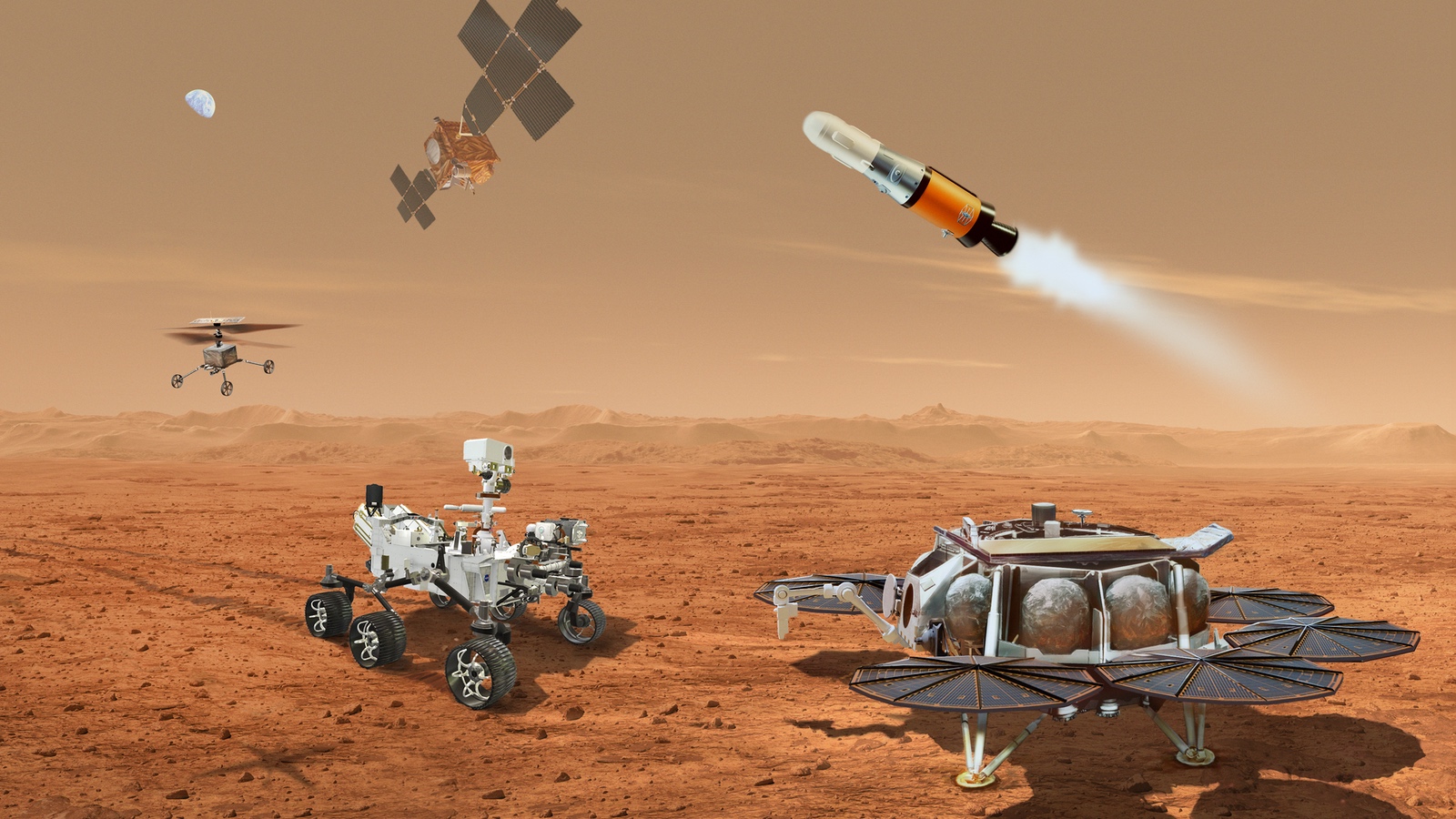Ending this market in 2030, as the latest IRB report estimates this as the launch date.
Update 2025-05-01 (PST) (AI summary of creator comment): Clarifications:
If the mission is NASA-led and has a primary purpose of retrieving samples, it is considered MSR.
Missions where the primary purpose is not sample return (e.g., humans landing on Mars) do not count as MSR.
Update 2025-05-01 (PST) (AI summary of creator comment): Clarifications:
If NASA contacts a commercial company to complete Mars Sample Return, the mission is not cancelled.
If NASA determines they do not want to move forward with MSR at this time and decides to table it for an indefinite amount of time, the mission is considered “cancelled” as there is no plan to move forward.
People are also trading
Adding a clarification just to be explicit: if NASA contacts a commercial company to complete Mars Sample Return, the mission is not cancelled.
If NASA determines they do not want to move forward with MSR at this time, and they want to table it for an indefinite amount of time, I’m leaning towards considering that “cancelled” as there is no plan to move forward. Open to hearing people’s thoughts.
NASA says it's revising the Mars Sample Return mission due to cost, long wait time
https://abcnews.go.com/US/nasa-revising-mars-sample-return-mission-due-cost/story?id=109235610
NASA Seeks ‘Hail Mary’ for Its Mars Rocks Return Mission - https://www.nytimes.com/2024/04/15/science/nasa-mars-sample-return-mission.html
NASA says it's revising the Mars Sample Return mission due to cost, long wait time - https://abcnews.go.com/US/nasa-revising-mars-sample-return-mission-due-cost/story?id=109235610
@Mqrius In my mind, if the mission is NASA-led and has a primary purpose of retrieving samples, then I would consider it still MSR.
@miles Alright, but then if its primary purpose is not sample return then it wouldn't count? So like, humans landing on Mars that also happen to pick up the tubes. Humans landing on Mars would presumably have as its primary mission the actual humans landing and surviving.
@miles Alright, but then something like humans landing on Mars wouldn't count, because the primary mission is the humans landing and surviving, right? Even if they also pick up the tubes, they're not really there for that.
@Mqrius Apologies for the delay!
Correct, humans landing on Mars with the primary purpose of Being Humans On Mars wouldn’t count for this market.
Not only are there a number of persuasive rationales which could potentially lead to the National Aeronautics and Space Administration's Mars Example Return (MSR) Mission being called off relying on the specifics given in the piece, however furthermore the NASA Mars Sample Return (MSR) Mission may be scrapped according to the information within the article. Therefore, the article supplies compelling grounds why the Mars Sample Return (MSR) Mission from NASA could possibly be ended. Not only that, but the piece presents strong arguments as to the decision to scrap the NASA Mars Sample Return (MSR)
Budgetary Restrictions: The key cause for the potential abandonment of the MSR Project is fiscal restrictions. The Senate's suggested finances for NASA involve massive deductions to MSR funding, along with a strict provision that NASA must come up with a scheme to retain the undertaking's complete expenditure within $5.3 billion in a small timeframe. If NASA fails to meet this provision, it may guide to the calling-off of the project because of issues regarding cost overruns.
The Senate's fiscal suggestions advise that whether Moon and Mars Base is unable to remain inside its economic plan, the leftover sums would be chiefly rerouted to the Luna returning Artemis undertaking. This redirection of assets aside from Moon and Mars Base underscores the Senate's dedication to placing preference on different space revelation ventures over a mission that encounters budgetary problems. However, on the other hand, the Senate's financial recommendations indicate that in the case Moon and Mars Base cannot stay within its budget, the surplus funds will likely be primarily steered toward the Luna returning Artemis project. This reassignment of resources from Moon and Mars Base stresses the Senate's commitment to prioritizing other space investigation initiatives rather than an expedition that experiences budget hassles. Not only that, but the Senate's fiscal suggestions advise that if Moon and
While the budget reductions for MSR fail to furnish more finances for other crucial planetary undertakings like VERITAS and Dragonfly. This implies the cash being subtracted from MSR would do nothing to advance or continue diverse significant missions inside NASA's portfolio concerning the examination of planets. The cutbacks will not reallocate assets to support vital probes searching for answers about our planetary neighbors. MSR's decreased backing does little to bolster the quest for information through alternative ventures in the administration bureau's planetary examinations.
The lack of clarity regarding MSR's funding allocation and likelihood of project termination fails to nurture the flourishing of such an audacious Mars initiative. Continuous re-examination of the venture's feasibility alongside fiscal constraints births an ambiance of unpredictability risking termination. How may one launch humanity's farthest frontier expedition sans assurance of resources? Moreover, doubts surrounding availability of monies to deliver supplies stifles pioneering of the red planet. Unless leadership provides permanence, this groundbreaking endeavor faces imperilment just as dreams commence liftoff.
Conflicting budgets threaten Mars program. The Senate and House hold opposing views on financing priorities that habitually back planetary exploration and NASA's Red Planet initiatives, potentially culminating in a policy gridlock. Should the two bodies fail to settle on allocating funds, Mars Sample Return's backing could continue to be imperiled and in the end face termination.
Contrary to previous expectations, budgetary issues and divergent views within legislative chambers now endanger the NASA Mars Sample Return Mission. Resources would alternatively propel novel space initiatives instead of prolonging benefits solely for Mars. Monetary unpredictability and congressional divisions further intensify challenges confronting the endeavor's survival. Perplexingly, funding questions and disagreements now imperil continuations thought inevitable.!
